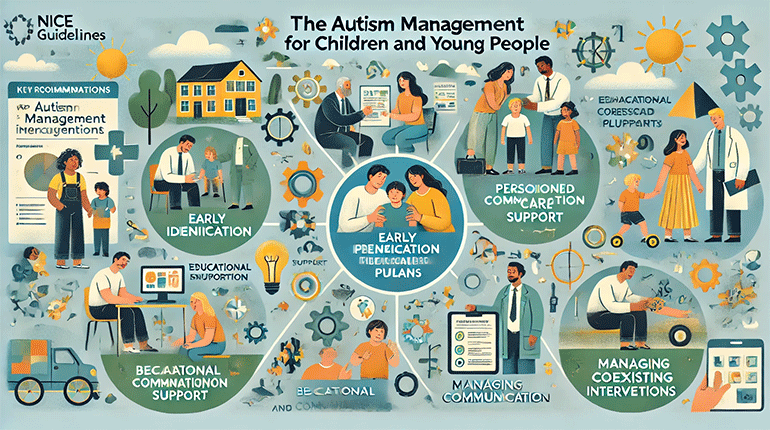Understanding the NICE Guidelines for Autism Management in Children and Young People
Overview
The guidelines developed by NICE (National Institute for Health and Care Excellence) outline comprehensive strategies for supporting children and young people with autism. These guidelines aim to enhance the quality of life, support development, and provide tailored care.
Key Recommendations
1. Early Identification and Assessment
- Prompt Evaluation: Encourage early recognition of autism symptoms in children and timely referrals for a comprehensive assessment.
- Multidisciplinary Approach: Assessments should be conducted by a team of professionals from various disciplines to ensure a well-rounded understanding of the child’s needs.
2. Personalized Care Plans
- Tailored Interventions: Develop individualized care plans based on the unique strengths and needs of each child or young person.
- Family Involvement: Actively involve families in the planning and implementation of care strategies, ensuring that interventions align with family preferences and values.
3. Educational Support
- Collaborative Approach: Work closely with educational institutions to adapt learning environments and provide necessary support.
- Teacher Training: Ensure educators are trained to understand and support children with autism, promoting inclusive educational practices.
4. Behavioral and Communication Interventions
- Structured Programs: Implement evidence-based behavioral programs that support communication and social interaction.
- Focus on Skills: Encourage interventions that build daily living skills and promote independence.
5. Managing Coexisting Conditions
- Holistic Health: Address any co-occurring mental or physical health issues through integrated care.
Implementation and Review
The guidelines emphasize regular review and adjustments to care plans as a child develops. Input from the child, family, and professionals is crucial to adapting strategies effectively over time.

